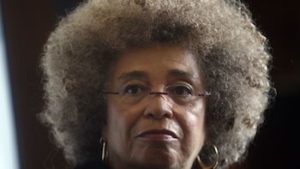
Angela Davis
*On this date in 1944, Angela Davis was born. She is a Black lesbian and bisexual (LGBT) woman educator and political activist.
From Birmingham, Ala., Angela Yvonne Davis lived in a section of town called “Dynamite Hill” because of the violence used by whites on blacks to maintain residential segregation. Both of her parents were educators, working with the local NAACP and instilling in their children not to accept the social oppression that American society gave black people.
When she was 15, Davis left Birmingham to attend the Elizabeth Irwin School in New York City. Davis also attended Brandies University, where Marxist philosophy influenced her. After graduating in 1961, she was further impacted as a social activist by the bomb killing of four Black Sunday school girls in Birmingham in 1963. Davis began her doctoral studies in philosophy at the Johann Wolfgang von Goethe University in Frankfurt, Germany. Still, he returned to the United States in 1967, when she decided she could no longer stay away from the growing American racial conflict.
Davis relocated to southern California to work on her master's degree at the University of San Diego; during this time, she became involved with the Student Non-violent Coordinating Committee (SNCC), the Black Panthers, and the Communist Party. Though hired in 1969 to teach philosophy at UCLA, Davis was fired soon afterward by their board of regents and then-governor Ronald Reagan for her affiliation with the Communist Party.
Though her case was appealed and overturned by the Supreme Court, she was in hiding because of an incident at Soledad Prison. In August 1970, George Jackson and his brother Jonathan, prisoners at Soledad, attempted to escape and were killed; the weapons were traced to Davis. She was on the FBI's ten most wanted list for two months while underground. After an apprehension, she was jailed for almost a year and a half before being tried for murder and conspiracy. In June 1972, Davis was acquitted of both charges in a highly publicized trial.
She remained politically active while resuming her academic career at San Francisco State University. Davis also ran for Vice President in 1980 and 1984 on the Communist Party ticket. As a professor and author, she has written several books. They include, If They Come in the Morning 1971, Women, Race, and Class 1983, and Women, Culture, and Politics 1989. Her autobiography, Angela Davis: An Autobiography, was published in 1974 and reissued in 1988.
Davis left the Communist Party in 1991 because the latter supported the Soviet coup attempt of 1991 following the fall of the Soviet Union and the tearing down of the Berlin Wall. Davis has written several books. A principal focus of her current activism is the state of prisons in the United States. She considers herself an abolitionist; Davis advocates focusing social efforts on education and building "engaged communities" to solve various social problems now handled through state punishment. Davis was one of the founders of Critical Resistance, a national grassroots organization dedicated to building a movement to abolish the prison system. She argues that the disproportionate share of the incarcerated African American population demonstrated racism in American society during this time. Davis has continued to oppose the death penalty.
As a lecturer, most of her teaching is at the graduate level; she says that she concentrates more on posing questions that encourage the development of critical thinking than on imparting knowledge. In 1997, she identified as a lesbian in Out magazine. We are facing a common enemy: Yankee Imperialism, which is killing us here and abroad. Now I think anyone who would try to separate those struggles would say that to consolidate an anti-war movement, we have to leave all of these other outlying issues out of the picture, is playing right into the hands of the enemy; she declared.
In 2001 she publicly spoke against the war on terror following the 9/11 attacks, continued to criticize the prison–industrial complex, and discussed the broken immigration system. She said people must "hone their critical skills, develop them and implement them to solve social justice issues." Later, in the aftermath of Hurricane Katrina in 2005, she declared that the "horrendous situation in New Orleans" was due to the country's structural racism, capitalism, and imperialism. Davis opposed the 1995 Million Man March, arguing that excluding women from this event promoted male chauvinism. She said that Louis Farrakhan and other organizers appeared to prefer that women take subordinate roles in society. Together with Kimberlé Crenshaw and others, she formed the African American Agenda 2000, an alliance of Black feminists.
At the University of California, Santa Cruz, Davis participated in a 2004 panel concerning Kevin Cooper. She also defended Stanley "Tookie" Williams on panels in 2005 and 2009. In 2008, Davis was a keynote speaker at Vanderbilt University's conference, "Who Speaks for the Negro?". She has visited Vanderbilt twice since then, most recently to give the Commemorative Murray Lecture on February 25, 2015, on college activism. In 2009, she was the keynote speaker at the University of Virginia Carter G. Woodson Institute for African American and African Studies symposium on The Problem of Punishment: Race, Inequity, and Justice. In 2011, Davis spoke at the Philadelphia and Washington Square Occupy Wall Street assemblies.
In 2012 Davis was awarded the 2011 Blue Planet Award, an award given for contributions to humanity and the planet. At the 27th Empowering Women of Color Conference in 2012, She has called for the release of Rasmea Odeh, associate director at the Arab American Action Network, who was convicted of immigration fraud after hiding her being convicted of murder. In 2012, Davis was the Rhode Island School of Design's MLK Celebration Series keynote speaker and 2012 Honoree. She supports the Boycott, Divestment, and Sanctions campaign against Israel. Davis was an honorary co-chair of the January 21, 2017, Women's March on Washington, which occurred the day after the Presidential inauguration.
In 2019, the Birmingham Civil Rights Institute (BCRI) rescinded Davis's Fred Shuttlesworth Human Rights Award, saying she "does not meet all of the criteria." Birmingham Mayor Randall Woodfin and others cited criticism of Davis's vocal support for Palestinian rights and the movement to boycott Israel. Davis said her award loss was "not primarily an attack against me but rather against the very spirit of the indivisibility of justice." On January 25, the BCRI reversed its decision and issued a public apology, stating that there should have been more public consultation.
Black Women in America An Historical Encyclopedia
Volumes 1 and 2, edited by Darlene Clark Hine
Copyright 1993, Carlson Publishing Inc., Brooklyn, New York
ISBN 0-926019-61-9
